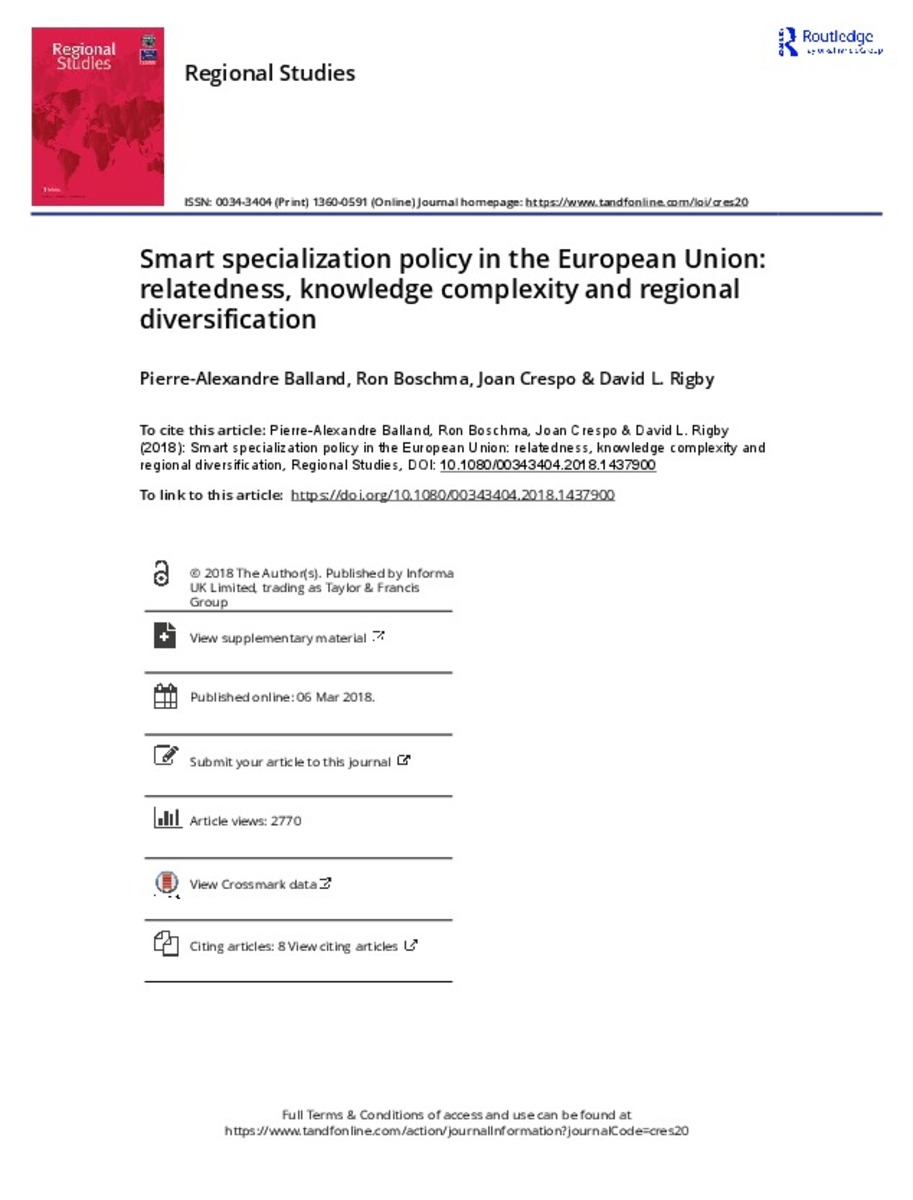Mostrar el registro sencillo del ítem
Smart specialization policy in the European Union: relatedness, knowledge complexity and regional diversification
| dc.contributor.author | Balland, Pierre-Alexandre | |
| dc.contributor.author | Boschma, Ron | |
| dc.contributor.author | Crespo, Joan | |
| dc.contributor.author | Rigby, David L. | |
| dc.date.accessioned | 2019-04-04T18:23:31Z | |
| dc.date.available | 2019-04-04T18:23:31Z | |
| dc.date.issued | 2018 | |
| dc.identifier.citation | Balland, Pierre-Alexandre, et al. "Smart specialization policy in the European Union: relatedness, knowledge complexity and regional diversification." Regional Studies, 2018, p. 1-17 | ca_CA |
| dc.identifier.issn | 0034-3404 | |
| dc.identifier.issn | 1360-0591 | |
| dc.identifier.uri | http://hdl.handle.net/10234/182226 | |
| dc.description.abstract | The operationalization of smart specialization policy has been rather limited because a coherent set of analytical tools to guide the policy directives remains elusive. We propose a policy framework around the concepts of relatedness and knowledge complexity. We show that diversifying into more complex technologies is attractive but difficult for European Union regions to accomplish. Regions can overcome this diversification dilemma by developing new complex technologies that build on local related capabilities. We use these findings to construct a policy framework for smart specialization that highlights the potential risks and rewards for regions of adopting competing diversification strategies. | ca_CA |
| dc.format.extent | 17 p. | ca_CA |
| dc.format.mimetype | application/pdf | ca_CA |
| dc.language.iso | eng | ca_CA |
| dc.publisher | Taylor & Francis | ca_CA |
| dc.relation.isPartOf | Regional Studies, 2018, p. 1-17 | ca_CA |
| dc.rights | © 2018 The Author(s). This is an Open Access article distributed under the terms of the Creative Commons Attribution-NonCommercial-NoDerivatives License (http://creativecommons.org/licenses/by-ncnd/ 4.0/), which permits non-commercial re-use, distribution, and reproduction in any medium, provided the original work is properly cited, and is not altered, transformed, or built upon in any way. | ca_CA |
| dc.rights | Attribution-NonCommercial-NoDerivatives 4.0 Internacional | * |
| dc.rights.uri | http://creativecommons.org/licenses/by-nc-nd/4.0/ | * |
| dc.subject | smart specialization | ca_CA |
| dc.subject | knowledge complexity | ca_CA |
| dc.subject | technological relatedness | ca_CA |
| dc.subject | regional diversification | ca_CA |
| dc.subject | European Union Cohesion Policy | ca_CA |
| dc.title | Smart specialization policy in the European Union: relatedness, knowledge complexity and regional diversification | ca_CA |
| dc.type | info:eu-repo/semantics/article | ca_CA |
| dc.identifier.doi | https://doi.org/10.1080/00343404.2018.1437900 | |
| dc.relation.projectID | Financial support from the Regional Studies Association (RSA) through the Early Career Grant awarded to Pierre-Alexandre Balland is gratefully acknowledged. The authors also thank the European Commission for its financial support through the project ‘Technological Diversification of Europe’s Regions’. Funding support by the JPI Urban Europe project ‘Resilient Cities: Industrial Network and Institutional Perspectives on Economic Growth and Well-Being’ [grant number 438-13-406] is also acknowledged by Ron Boschma. | ca_CA |
| dc.rights.accessRights | info:eu-repo/semantics/openAccess | ca_CA |
| dc.relation.publisherVersion | https://www.tandfonline.com/doi/abs/10.1080/00343404.2018.1437900 | ca_CA |
| dc.type.version | info:eu-repo/semantics/publishedVersion | ca_CA |
Ficheros en el ítem
Este ítem aparece en la(s) siguiente(s) colección(ones)
-
ECO_Articles [692]
Excepto si se señala otra cosa, la licencia del ítem se describe como: © 2018 The Author(s).
This is an Open Access article distributed under the terms of the Creative Commons Attribution-NonCommercial-NoDerivatives License (http://creativecommons.org/licenses/by-ncnd/
4.0/), which permits non-commercial re-use, distribution, and reproduction in any medium, provided the original work is properly cited, and is not altered, transformed, or built
upon in any way.








